Safety Waves versus Death Waves
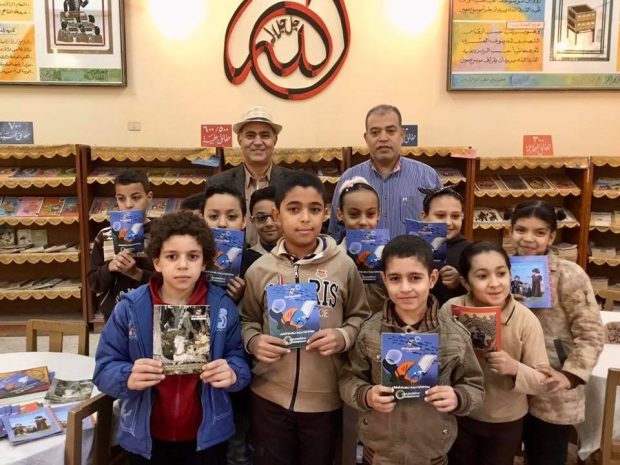
Writer, top left, visits his primary school; Abdul-Monem Riyadh, Benha, with students holding some of his books for children
A keynote speech at the 60th African literature and writers’ anniversary conference
By Ashraf Aboul-Yazid
IBADAN, NIGERIA: In our time, we live in more than one circle; circles that narrow and widen, touch, overlap and intersect, and sometimes even resist each other, and contradict with other circles. They are circles described as private and public, personal and family, community and country, until we arrive at the human beings ‘circle as part of the great cosmic circle.
Between these circles, waves operate their influence. As writers we are aware of how reading, for example, has its effect on us. When we chose its mirror; writing, we knew the power of this influence, it is true that we write for ourselves, but we also write for an implicit reader, and a hidden receiver, we seek to influence him with our letters, as we were affected by the letters of others.
But today’s readers are suffering a lot. Their lives have trampled over them with so critical problems. They are threatened by poverty, crushed by unemployment, wars, and disease overcomes them. The statistics tell us a lot about the aggravation of humanity’s problems in the twenty-first century, as if the more humanity progresses, the more it crushes the human beings on the way to progress.
According to unemployment statistics in Africa in twenty countries, their unemployment rates are ranging between 29% and 10% ; which are large proportions according to the population numbers. South Africa recorded the highest unemployment rate in Africa in 2020, where almost 29 percent of the country’s workforce was unemployed. Lesotho and Eswatini followed, with unemployment levels reaching nearly 25 percent and 23 percent, respectively.
Today, the citizens are no longer victims of authoritarian regimes alone; the monsters of the pandemics, high prices and corruption have drawn in on them, to the extent that well-being is no longer on their list of ambitions, but rather is satisfied with meeting their basic needs. Safety has become a basic requirement, which they seek, safety at home, street, school and workplace, safety for them and their families, safety for them and their communities.
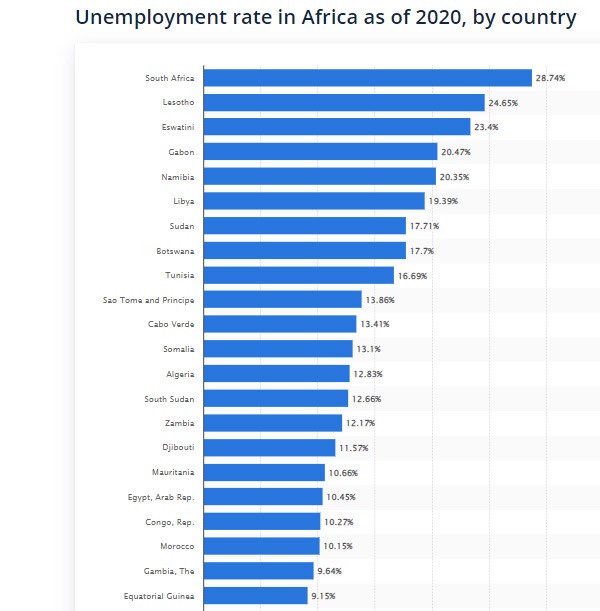
Science has helped us, or technology has caught us, in the trap of estrangement with the other as it is a security factor for ourselves from the oppression of the others and their negative impact. We have established separate islands that are linked to others only by digital technology. The means of communication have become one of the tools of non-communication; we are now replacing written, audio and video messages for live meetings, and clichés on individual congratulatory occasions, and we are keen to fence our islands to protect them from penetration, as if we are electronic devices afraid of virus piracy. We have deluded ourselves that we are happy, each on his island, even within members of the same family.
We thought it was safe! However, the tentacles of extremism brutalized that safety, after it spread to threaten every possible safe space: targeting girl students in their schools, killing believers in their places of worship, threatening workers in their factories, and blowing up the masses in markets. Extremist terrorist operations did not exclude a place where it wreaked havoc.
The question we – the writers – must answer is: What will we do?
In fact, in the midst of this fierce ocean with its deadly waves that threaten our safe islands, we must think seriously about creating safety waves that protect our present and secure our future.
The writer and poet’s role does not end by handing over texts to the publisher, or giving words to the publishing platform. Our role does not stop when our books and collections are published. In fact, that is the beginning; the real role is for these texts to interact with the circle of readers.
Today, I will discuss with you few ideas, in which the writer becomes a beacon in his depressed society, and a inspiration in his bleak surroundings. That is, to turn into a candle that lights up the footsteps of comrades and family in the dark, and a lamp that lights the way for others in frustrated societies.
We need someone who inspires hope and motivates souls to work. It may be worthy of a writer who has achieved success, to give gratitude to the root places of this success. Did our friends think of visiting their first school, in which the journey of education and reading began, and in which the roots of interest in literature were planted?
The truth is that my own experience was amazing, when I took a collection of my publications for young students and adult teachers. I visited my primary school in my hometown, and entered the library whose content I owe the beginnings of reading and a love of knowledge. A discussion took place with young boys and girls about reading and writing. I believe in the positivity of this wave issued by that gathering.
Let us imagine that writers on a visit to their first schools with messages that grow in these meetings to produce waves of safety, and urge the young generation to focus on reading, which for all of us represents a positive, influential, and effective act. Reading saved my childhood, and I think many of you would agree with me.
Today, the battalions of male and female writers have had access to many platforms that make their voices fully heard and aeen. One of the problems facing our African continent is illegal immigration, which claims thousands of lives every year. Why not be our campaign dedicated to raising awareness of the dangers of this illegal trend?
Figures of illegal immigration from Africa are available from multiple sources and are estimated at hundreds of thousands each year. The fates of these people are divided between drowning at sea or being tortured or deported on and from land. These adventurers who lost their lives were sent by despair to the boats of death. Who puts out the fire of despair?
People in despair did not find someone to hear their voice, nor did they find a merciful voice calling them, from the soil of their homeland, I do not say that we have to bleed the facts in order to bear what they are in, but we have to think about drawing alternative ways for them.
It is our duty to offer solutions and suggest means for officials in both public and private sectors to allocate a percentage of the profits to the care of these destitute. Simple temporary pensions and soft loans are two means that may succeed in dissuading hundreds of thousands from undertaking an adventure in which they pay the smuggler huge sums for the sake of a great delusion.
Africans in Europe
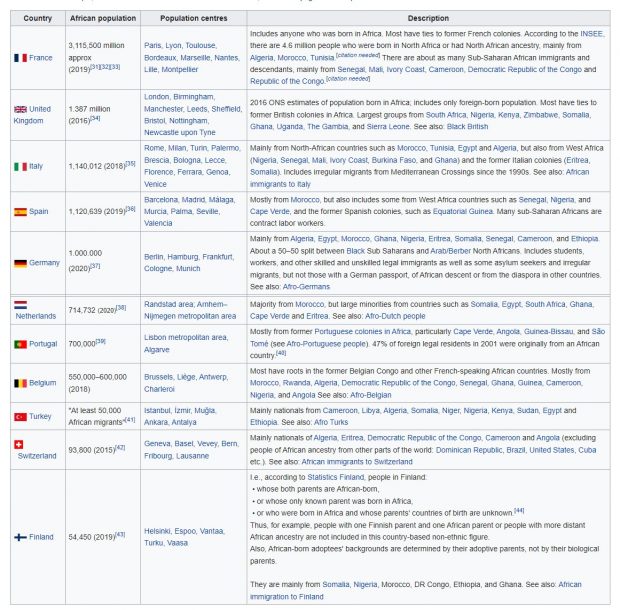
After a century of all African migrations to Europe, legal and illegal, the number of Africans registered in the countries of the old continent does not exceed but a little ten million, with 440,000 traveled in five years between 2000 and 2005.
There are about 3,115,500 million Africans in France (2019 census), 1.387 million in UK (2016 census), 1,140,012 million in Italy (2018 census), 1,120,639 million in Spain (2019 census), 1 million in Germany (2020 census), 714,732 in the Netherlands (2020 census), 700 thousand in Portugal, 550,000 thousand in Belgium (2018 census), 93,800 thousand in Switzerland (2015 census), at least 50,000 thousand in Turkey, and over 54,450 thousand Lowest in Finland (2019 census). Those who have succeeded in migrating to the European paradise are a very small percentage compared to the population of our continent, which has a population of more than 1.216 billion people (2016 census).
We are responsible to more than a billion people to play the role of searching for an alternative paradise in Africa for its inhabitants and people. Hence, development in African countries is a priority for the establishment of this paradise.
Our duty is to urge officials to develop and present our innovative ideas to benefit from natural resources in history and tourism. Our duty is to spread waves of hope to achieve security for these sons and daughters, and to send waves of optimism for parents. Every and each writer, all poets and poetesses must turn into a field to send the waves that attract hope.
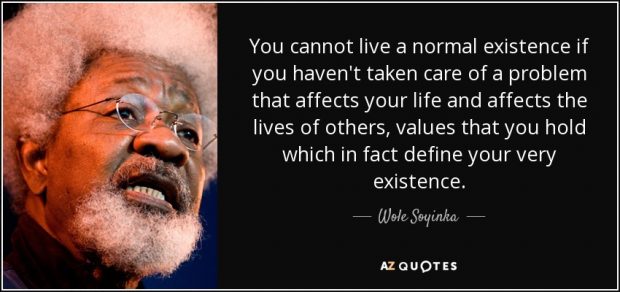
I might borrow Wole Soyinka’s phrase: “You cannot live a normal existence if you haven’t taken care of a problem that affects your life and affects the lives of others, values that you hold which in fact define your very existence.”
Let us think together; we see advertisements on the back of bills in every bank, store or gas station. So why don’t we put, next to ads, phrases like this that millions will see every day.
How many people reading Soyinka’s phrase will rethink their connection to roots: “There is only one home to the life of a river-mussel; there is only one home to the life of a tortoise; there is only one shell to the soul of man: there is only one world to the spirit of our race. If that world leaves its course and smashes on boulders of the great void, whose world will give us shelter?”
This is in Nigeria, and similar examples can be taken of great writers and poets in all of Africa. Not just on food bills, but on streetlights poles, on the desk backs of bus stops, and inside billboards at subway and train stations,
How I would love to read in Senegal one day this phrase in more than one space, written by its great poet Léopold Sédar Senghor (Below): “No one has the right to erase my culture because a community without a culture is a people without human beings”.
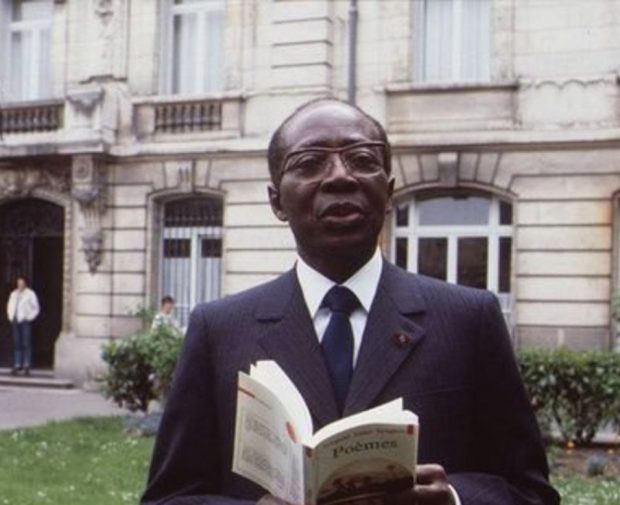
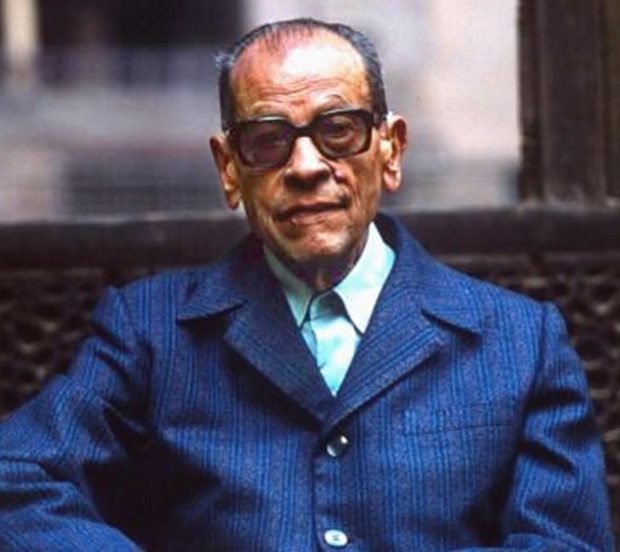
Just as I want the phrase of Naguib Mahfouz (above) in Egypt to be on every door: “The conscious mind is able to respect an idea, even if person does not believe in it.”
Rather, I may be more optimistic, when I dream that sports commentators, with their papers filled with repetitive numbers, carry short poems for the peoples of Africa to read. One match is watched by millions. The dream of African poets will be fulfilled; that their poems will be heard by millions at one time, on television.
Perhaps a writer, poet or creator in the responsibility position of radio and television unions, can allocate the match commentator for one minute – in which play stops during the ninety minutes- and often this happens, to read a short text, there will be more than 200 texts, by 200 poets or writers, in a sports season. What a breakthrough, it would be a poetic and prose revolution without a doubt.
In our Islamic law and heritage, we believe in zakat; and work with it. It is the tax due on every income. I do not exclude culture, literature and the arts from this income. So, I invite every writer, every poet and every publisher to allocate a zakat on his books; a percentage of published works to be donated to public libraries, to school libraries, and to libraries of social and sports clubs. Let books speak in your name in every space. It is your letters that transcend you.
I would also like to salute the experiences of libraries based on personal initiatives, to urge children to read, in places far from the main cities; those caravans in which one or more persons work to transport a group of books on a car that provides a free reading service. I wish the writers would accompany that caravan to read their books for children. Let us salute the reading convoys, for a knowledge silk road that lays the foundation for the ambition of new generations.
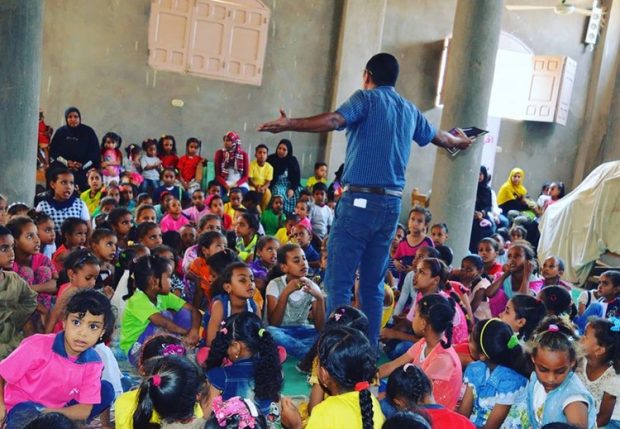
One of the initiatives to encourage reading among children in villages is the Tales’ Car by writer Haythem Mohammai
We are moved by words, in nations that believe in the power of letters, and our oral and written cultures are based on words. These words are the core of the waves of safety, which will serve as a blocking wall against the tidal waves attacking our safe islands.
























































